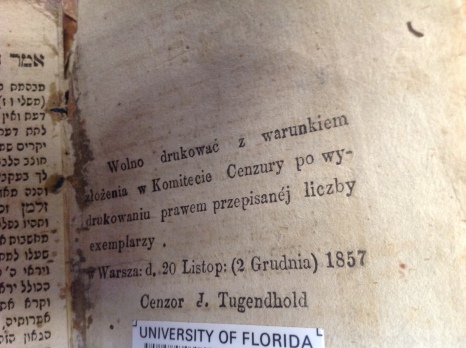Lingering around one of the books in the Judaica Suite, a thin, tattered work bound in paper, is the ghost of a 19th-century Jewish censor. The book is a rare edition of Toldot Adam, a biography of Elijah ben Solomon, the Gaon of Vilna, composed by Ezekiel Wolf in 1801 and published in Warsaw in 1857. In addition, to being an important account of a leading Jewish scholar, this particular edition captures our interest due to its notice of censorship.
The notice states that the publication of this work has been allowed because it has met the criteria of the Censorship Committee, which has decreed that a discreet number of copies may be printed. The notice concludes with the date December, 2, 1857 and the name of the censor, J. Tugendhold.
Jacob Tugendhold (1794-1871) was a Jewish scholar and author who served as a liaison to the Polish government. Tugendhold first worked as a private tutor, and was later commissioned to create Poland’s first state-run Jewish elementary schools.
His close association with government institutions would lead to other appointments, including director of a cholera hospital, member of the Civic Committee for municipal authorities in Warsaw, and the government appointed censor of Hebrew publications.
The 19th century witnessed a geographical shift in the center of Hebrew and Yiddish printing to Russia and Poland, and alongside that came the introduction of harsh government censorship. Books of a religious nature, Hasidic literature in particular, were subject to intense scrutiny and were often destroyed. The importing of Hebrew books to Poland was banned and examiners were appointed to visit Polish cities to ensure that this policy was upheld. Books like the one in the Judaica Suite, survived only because of the intervention and bravery of Jewish censors like Tugendhold and his brother, Wolf, who served as the censor in Vilna.
Tugendhold’s focused his own writings on fighting anti-Semitism. His struggle against Polish anti-Semitism led him to be involved in many high profile public disputes, and a number of his publications provoked heated debate.
Despite an active life, engaging in public life and defending his people, Jacob Tugendhold died in 1871 in poverty and obscurity.
Sources:
- Moss, Kenneth B. “Printing and Publishing: Printing and Publishing after 1800.” YIVO Encyclopedia of Jews in Eastern Europe 27 October 2010.
- Nathans, Benjamin and Gabriella Safran (eds), Culture Front: Representing Jews in Eastern Europe, University of Pennsylvania Press, Philadelphia, 2008.
- Popper, William, The Censorship of Hebrew Books, The Knickerbocker Press, New York, 1899.
- Wodziński, Marcin. “Tugendhold, Jakob.” YIVO Encyclopedia of Jews in Eastern Europe 29 October 2010.
- Wolf, Ezekiel Feivel ben Ze’ev, Toldot Adam… Shelomoh Zalman mi-Vilna, Warsaw, T. Y. Bomberg, 1857.

